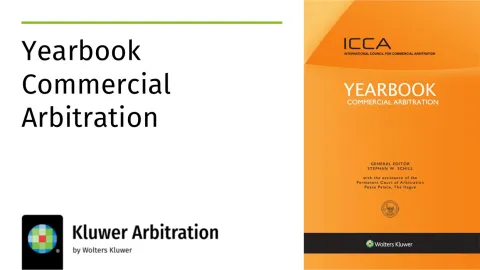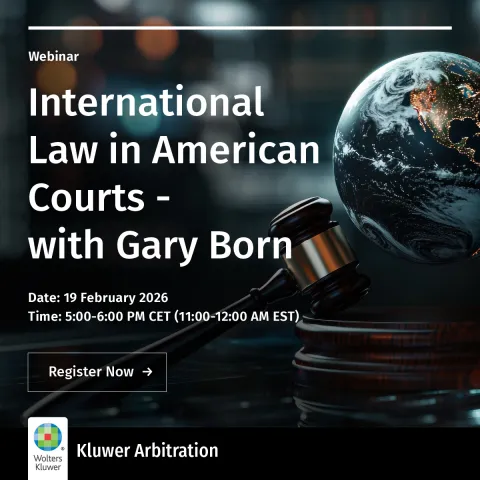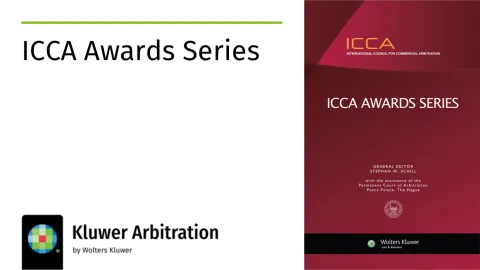Different Interpretations of Jurisdictional Limits in Junefield Gold v Ecuador: Arbitral Authority or an Empty Shell?
October 1, 2025
In Junefield Gold v Ecuador, the Tribunal’s Majority recently issued a partial award on jurisdiction (“Award”) under Article 9(3) of the China-Ecuador BIT, finding that it has jurisdiction to determine the merits of the Claimant’s expropriation claims. By contrast, Professor Philippe Sands KC delivered a dissenting opinion (“Dissent”), favouring a narrower interpretation of the Treaty’s jurisdictional clause: the Tribunal, in his view, had jurisdiction to only decide the amount of compensation for an expropriation, not whether an expropriation had occurred at all. As evidenced by previous rulings split on similarly worded treaties, this interpretive divergence is hardly new; yet its impact on arbitration’s adjudicative essence may be relatively harmless or considerably more substantial depending on the point one selects on the spectrum running, roughly speaking, from the Majority to Sands. In what follows, this blog post first presents the spectrum of differing interpretations, as well as the contextual factors that sharpen them. It then discusses other arbitral decisions as a reflection of the recurring challenge that causes a fault line in practice. Finally, it adds principled arguments against an overly strict interpretation of such jurisdictional clauses.
Different Meanings of Article 9(3) of the China-Ecuador BIT
The heart of the disagreement lies in the Treaty’s jurisdictional clause, Article 9(3), which allows for arbitration before an ad hoc tribunal if “a dispute involving the amount of compensation for expropriation cannot be settled within six months after resort to negotiations [under Article 9(1)]” (emphasis added). Recourse to such arbitration will be unavailable, however, if the investor resorts to the procedure under Article 9(2), submitting any dispute in connection with an investment to the local courts.
The Majority interpreted the phrase “involving the amount of compensation for expropriation” expansively. In applying the Vienna Convention on the Law of Treaties, they reasoned that its jurisdiction must include the “antecedent issue of occurrence of an expropriation”, and not just the amount of compensation due (Award, para. 241). For them, such an interpretation gives inclusive meaning to the word “involving”, implying that what follows is simply part of a broader whole. Arguing instead – as the Respondent did – that its meaning is merely neutral comes down, in the Majority’s view, to holding that “the word need not be there at all”, or that it could be read as limiting (rather than including) expropriation claims (Award, para. 242).
Sands, by contrast, argued for the narrower, neutral reading. To him, the Treaty’s same authentic language versions show no inclusive or expansive intent. Article 9(3) gives jurisdiction to the Tribunal only to determine disputes concerning the amount of compensation for an expropriation, not also the occurrence or legality of an expropriation. Contrary to the Majority’s reasoning, the wording of the jurisdictional clause, Sands argues, “reflects a clear choice” (Dissent, para. 5) – to interpret otherwise renders this choice practically meaningless.
Fork-in-the-Road and Treaty Structure
Two contextual factors sharpen the different interpretations. First is the fork-in-the-road provision contained in Article 9(3). After the six-month cooling-off period, either party may choose between the competent local courts and arbitration. The Majority argued that this concurrent availability suggests there is no division between occurrence, legality, and compensation. They worry that, on a more restrictive interpretation, investors facing indirect expropriation must first litigate the occurrence and legality in court before being able to ask an arbitral tribunal to decide on the amount of compensation. This, they argue, would leave the fork-in-the-road provision without any effect.
On this point, Sands sided with the reasoning in Beijing Shougang v Mongolia, namely, that forks-in-the-road only preclude jurisdiction if the “triple identity test” is met, which he considers unlikely where courts rule on expropriation and arbitrators calculate the amount of compensation. To Sands, this is fully in line with the “real object” of effet utile – to give an agreement “some effect, not none” (citing Fitzmaurice, p. 373). Moreover, he says, it is exactly what the treaty drafters had intended: investors bringing indirect expropriation claims need a local court’s declaration before turning to arbitration for compensation.
A second contextual factor sharpening the diverging interpretations is the Treaty’s substantive expropriation provision in Article 4. The Majority noted that Article 4 “makes no mention of the possibility – let alone the need – for local courts to determine the occurrence and/or legality of an expropriation” (Award, para. 237). To them, this again indicates no clear division between compensation and occurrence. Sands acknowledged a link with Article 9(3) but emphasized the focus of Article 4 on “fair compensation” instead. He saw a clear intention to limit the Tribunal’s jurisdiction to whether compensation was “equivalent to the value of the expropriated investment”, not any other expropriation claims (Dissent, para. 17).
A Familiar Divide
This fault line is not new. It reflects a recurring challenge of interpreting restrictive jurisdictional clauses. Other tribunals, addressing similarly worded treaty clauses, have equally split in the past.
On one end of the spectrum, we find decisions that adopt a broad interpretation, similarly to the Majority. In Tza Yap Shum v Peru and Beijing Urban v Yemen, for example, the tribunals found that the treaty provisions’ combined effect precluded investors from resorting to international arbitration altogether if they had brought the dispute before the local courts. The Tribunal in Sanum Investments v Laos, which dealt with near-identical treaty wording as in Junefield Gold, held that an expropriation’s legality conditions and the amount of compensation overlap and cannot practically be separated. The Tribunal in Sanum concluded – as the Majority did here – that a narrow interpretation would leave the jurisdictional clause without effect. The Singapore Court of Appeal upheld the Sanum award (discussed here, here, and here).
On the other end, tribunals in AsiaPhos v China and Beijing Everyway Traffic v Ghana held that the jurisdictional clauses comprised disputes relating to the amount of compensation only. Interestingly, Stanimir Alexandrov’s dissent in AsiaPhos serves as the mirror image of Sands’ in Junefield Gold. However, the clauses in these two cases differ from Article 9(3) of the Treaty in important ways: both the China-Singapore BIT and the China-Ghana BIT expressly indicate that the legality of an expropriation is to be reviewed by local courts, and the latter, additionally, does not contain a fork-in-the-road provision. The Beijing Shougang decision above, relied on by Sands, was based on similar treaty wording and concluded against jurisdiction over expropriation claims.
As practice stands, there is an equal split between interpretations of the phrase “involving the amount of compensation for expropriation”. Tribunals at opposite ends have held that the ordinary meaning of restrictive jurisdictional clauses supports either approach, broad or narrow. Nor are these diverging views confined to China-related cases. Other decisions reveal the same divide, with tribunals adopting a broad interpretation in cases such as Sedelmayer v Russia, EMV v Czech Republic, and Renta4 v Russia, while those in Berschader v Russia, Austrian Airlines v Slovakia, and RosInvest v Russia went with a narrow one (discussed here). Awards following the broad interpretation have also faced contrasting judicial responses, being upheld by the English High Court but annulled by the Swedish Court of Appeal.
The dilemma between these paths is increasingly debated in the literature. One article, analyzing the above cases, concluded that a narrow interpretation reduces Chinese investors’ ability to secure access to international arbitration in the future, while recent trends show an exponential growth in Chinese claims and pending proceedings will soon materialize (e.g. in Wang and others v Ukraine and PCCW Cascade v Saudi Arabia). At the same time, as Sands underscored, it is China’s clear policy and practice to draft treaties with restrictive jurisdictional clauses (a potential benefit when acting as Respondent, e.g. in the pending Goh Chin Soon v China arbitration). An overly broad reading of such provisions – alongside expansive use of most-favored-nation clauses – risks undermining that intent and should therefore be approached with caution. Against this backdrop, the Junefield Gold Tribunal did well not to extend jurisdiction to other obligations through the Treaty’s MFN clause.
Ghost in the Shell: A Case for the Essence of Adjudication
While it may be too soon to tell if tribunals will continue down both paths, there is a principled argument against the narrower one. Courts and tribunals should have incidental jurisdiction to decide liability for expropriation as a necessary antecedent to the amount of compensation. Liability and quantum are so inextricably linked that separating them risks hollowing out the essence of adjudication. This view finds support in Chorzow Factory, Corfu Channel and LaGrand, as well as in Bin Cheng’s work on general principles of law. As argued elsewhere, “arbitrators may appropriately take a broad approach to their own jurisdiction and to dispose of every claim that is an integral part of the dispute because of their inherent power to exercise an adjudicative function” (Brenninkmeijer & Gélinas, p. 586). Still, like any inherent power, incidental jurisdiction should only be exercised when necessary and not where “excluded either explicitly or implicitly in a broader regulatory context” (Radović, p. 185). In Junefield Gold, there was no explicit exclusion, leaving it a matter of interpretation whether an expropriation’s occurrence and the amount of compensation are separable. By contrast, the Tribunal in Beijing Everyway rejected incidental jurisdiction precisely because that treaty explicitly allocated the review of expropriation’s lawfulness to competent local courts.
Assuming that these issues can indeed be separated (e.g. as primary and secondary duties of compensation), even then the form of jurisdiction flowing from a narrow interpretation remains questionable. The result would mirror Beijing Everyway – despite different treaty structures – and revives doubts about whether the fork-in-the-road provision has any effect at all. When tribunals start accepting jurisdiction over quantum, but not, incidentally, over the necessary antecedent of entitlement, they arguably function like a tribunal without arbitral jurisdiction, akin to an expert panel whose determinations are binding but not directly enforceable. The notion of arbitration would lose sight of its contours. Admittedly, the line between arbitration and expert determination may at times be faint or inconsequential, and calculation of compensation is rarely simple. Yet, overly narrow limits may enclose arbitral authority in a form without its adjudicative character, essentially relegating it to an empty shell.
You may also like










